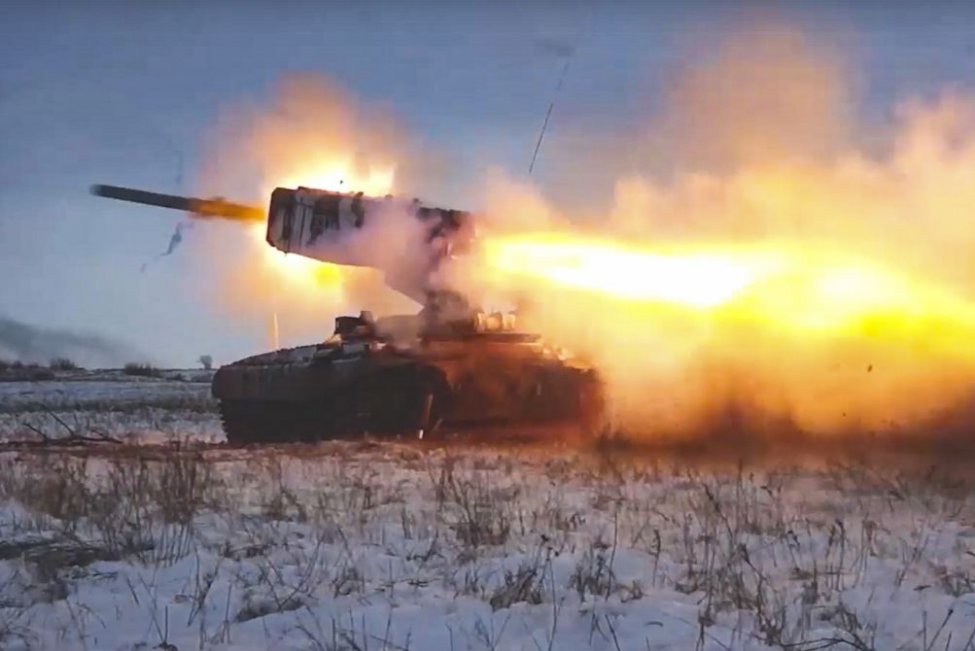A Russian TOS-1 heavy flame thrower system fires during military drills near Orenburg, Russia last month. Photo courtesy of Russia Defense Ministry/EPA-EFE
Jan. 18 (UPI) — Russia on Tuesday began moving troops to Belarus for joint military exercises that are raising worldwide concern over the possibility of a plan to invade Ukraine.
The exercises, known as United Resolve, coincide with a recent buildup of Russian troops on Ukraine’s eastern border.
TASS, the Russian government’s official news agency, said Belarus and Russia “will hold a snap inspection of the Union State’s forces and capabilities before the joint drills scheduled for February.”
In recent days, train and road convoys of armored vehicles have entered Belarus following an announcement by President Alexander Lukashenko about the imminent war games with Russian forces.
Last month, Russia began amassing about 100,000 troops on Ukraine’s border, according to a report on Monday from the British government, which is supplying the nation with short-range anti-tank missiles.
Ben Wallace, Britain’s minister of defense, said Monday the kingdom and its allies “have legitimate and real cause for concern that the configuration and scale of the force being assembled, supported by Russian air and maritime long-range strike capabilities stationed in the region, could be used for the purpose of conducting a multi-axis invasion of Ukraine.”
U.S. Secretary of State Antony Blinken began a three-day trip Tuesday to Ukraine and Germany.
During a teleconference Tuesday, a senior State Department officials speaking to reports on background called Russia’s movement of troops into Belarus “concerning” and another indication of Russia “further preying” upon the former Soviet nation’s embattled president, Lukashenko.
The official said that the timing of the military exercises could be a guise to station troops in Belarus to attack Ukraine from the north.
Belarus is also expected to have a constitutional referendum in February with proposed changes to include language that could allow Russia to garrison forces in the country as well as nuclear weapons, which would “present a challenge to European security that may require a response,” the official said.
Last month, Lukashenko also said he is considering offering Moscow territory to stash nuclear weapons.
“All of this shows us that Lukashenko’s position has weakened, possibly beyond recovery,” he said.
The officials explained that the movement of Russian troops does not mirror that of a normal exercise, which requires notification 42 days in advance and if it involves more than 13,000 troops international observers are required.
“That’s what normal looks like,” the official said. “What this is is something entirely different.”
Lukashenko, who has ruled Belarus as a dictator for nearly 30 years, has been under increasing international pressure following his election to a sixth term in office that has been widely discredited by world leaders.
The subsequent crackdown on protests has forced opposition leaders to flee to neighboring countries and authorities to arrest as of Tuesday 993 political prisoners, according to Viasna Human Rights Center.
And numbers excepted to climb.
“There is no escaping that having dedicated his 27 years in office to claiming to be the guarantor of Belarus’ sovereignty and independence, Lukashenko has increasingly shown that he will trade it all in order to stay in power,” the State Department official said.
The United States has been leading efforts to come to a diplomatic solution to the confrontation, but has repeatedly warned Russian President Vladimir Putin that if it further invades Ukraine there will be a decisive response.
The confrontation occurs as Ukraine, which saw Crimea annexed by Russia during its invasion in 2014, seeks to be a member of the defensive military alliance NATO, which Putin is against stating that would pose a security threat.
Russia has repeatedly denied having any intention to invade Ukraine.
